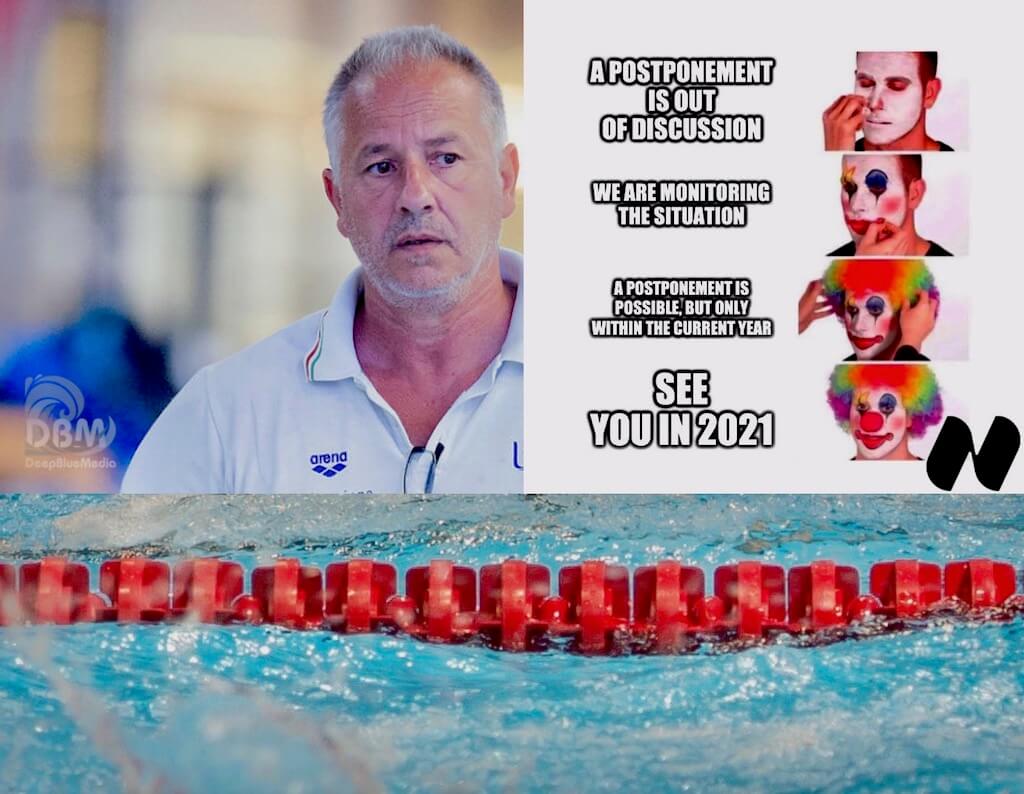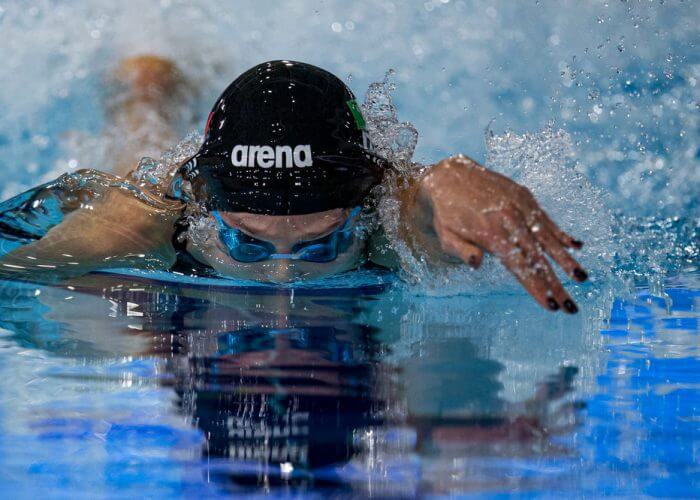Send in the Clowns: Coach Walter Bolognani On The Challenges Of Corona Season

Commentary
In the wake of the tardy decision to postpone the Tokyo 2020 Olympic Games, Swimming World is talking to athletes and coaches about what the change of schedule forced by the coronavirus (COVID-19) pandemic means to them. Here, we consider the backdrop, the extent of the global health crisis unfolding and its impact on Olympic sport, and talk to Walter Bolognani, head coach to the Italian National Junior Team, World Swimming Coaches Association (WSCA) board member and and co-founder of Nuoto.com about the hurdles ahead.

The Olympic Games is, of course, just one of many competitions, goals, dreams and ambitions to be blown off course by the pandemic. This from the maestro of Italy’s pool of talent sums up one of the key challenges:
On the mental challenges unfolding, Coach Bolognani
“What I’m worried about are athletes and their mental capacitiy.
“I’m dealing with youth/junior guys who, for reasons of age, experience and mentally, aren’t in the same place as the elite swimmers.
“Targets are fading and we’re at a stage of critical/dangerous emotional bounce.
“I go from one video call to another with guys looking for certainties I know I can’t give … the adult, the coach, is the reference, the safety, the shelter where every young person can and must count on. Under the current circumstances, this is a great burden for all colleagues.”
You can find the full quote on that below as Bolognani sets out four key concerns at this stage of the challenge unfolding.
With a nod to events in his own country, coach Bolognani said:
“Swimming pools are privately managed, clubs operate in these.
“Coaches are working with weak contracts and those are not very lucrative. I live in a privileged position but I have great concerns for the majority of my colleagues whose situations can be summed up in these two thoughts:
- “Swimming pools closed, no activities, no cash, no salary.
- “Coaches and teachers are “producing” swimming.
“This is a situation that needs to be addressed.”
Swimming World will do just that in the course of our coverage.
The Backdrop
Bolognani’s country, Italy, was the first European nation hard hit by the spread of the virus. Since the first infection was recorded in the country in mid-February, the scale of the crisis soared rapidly from the turn of the month, and as Italy crumbled to impose lockdown measures, the Ides of March arrived with a count of 25,000 cases.
Just 10 days on: 74,386 cases; 7,503 deaths; 9,362 recovered. As this day begins. There are more than 57,500 patients still fighting the bug, of those almost 3,5000 fighting for their lives in serious or critical conditions.
Spain joined Italy yesterday in the club of countries with higher statistics than the official numbers being given by China, where the outbreak began in mid-November last year, weeks before being reported to the World Health organisation (WHO).
In the United States, the death toll from the virus topped 1,000 by the close of March 25, after the first infection was reported February 29. A leap year with a leap in global mortality predicted by experts for at least eight weeks now.
On the Global Health Security Index, a report card that grades every country on its pandemic preparedness, the United States has a score of 83.5. Word No 1: the readiest of nations. The test is now live.
This morning, the global count of cases stands at 471,794 cases, 21,297 deaths, 114,703 recovered – and an important group because of the antibodies built naturally that are now part of the process of finding, developing and rolling out a vaccine in due course.

The Coronavirus case count on March 26, 2020 – Photo Courtesy: Worldometer
It is against that backdrop that the Tokyo 2020 Olympic Games was finally postponed because of the pressure brought to bear on the International Olympic Committee and Tokyo 2020 organisers by athletes, their representatives and the brave among domestic sports federations and National Olympic Committees, Australia effectively ruling out participation at Tokyo 2020 in July before Canada brought the gavel down as the First Nation to send an official apology and red line: ‘We won’t be sending a team’.
Send In The Clowns
The spread of the virus and its toll on people and the economies underpinning the way we live are being felt not only in sport. Athletes, feds, fans and others working and watching in sport got it: the solidarity shown in the pleading for Olympic postponement was not only for reasons of preparation thrown off course but because they could see illness, life and prospects thrown off balance, jobs and ambitions and plans and hopes and dreams on hold or trampled under foot.
This was bigger than sport, the German media among many weighing in on that point yesterday as they took Thomas Bach, the president of the IOC to task. This morning in The Guardian, the IOC is accused of putting the health of athletes and coaches at risk by pressing ahead with tournaments at a time of pandemic.
There may be more of that ahead.
Meanwhile, Walter Bolognani set out his four key responses to the issue dominating life in 2020:
‘Better to have a bad truth than an illusory lie’
“Even against the backdrop of dramatic circumstances around the world and here at home, the deafness to the needs of those who are struggling in the field of play, to the main protagonists of the show in sport, has been striking.
“Since the beginning of March, the creaks in the sports system, what it would all mean for us, have been self evident and, finally, common sense led to the decision taken on Tuesday.
“We have been hearing for weeks that after the tragedy unfolding we will come out changed. Well, we also hope that the dynamics of those who lead us will also change.
“It’s better to have a bad truth than an illusory lie. We need interaction, sharing, communication, adherence to reality and not to politics, business and external interests.

Federica Pellegrini surfing at speed – Photo Courtesy: Patrick B. Kraemer / MAGICPBK)
His advice is pertinent to the whole sports community, to coaches, athletes – and governors, who might learn lessons from the solidarity and fairness athletes have embraced:
“Step down from the throne, engage the brain, embrace mental exercise and go back to your roots, the stuff made of sweat, sacrifice, defeats, victories, dreams and rules.
“Clear, fair rules and positions free of interest and pressure of any kind.”
2. The Mental Challenge for Athletes
“What I’m worried about are athletes and their mental capacitiy.
“I’m dealing with youth/junior guys who, for reasons of age, experience and mentally, aren’t in the same place as the elite swimmers.
“The process that has already begun is that of maintaining the psychological balance of our swimmers. In Italy we have had forced inactivity for a few weeks and after a first enthusiastic boost of ‘schools closed’, for dry-land home training in a “Kafkian-collective-happening”, reality is setting in.
“Targets are fading and we’re at a stage of critical/dangerous emotional bounce.
“I go from one video call to another with guys looking for certainties I know I can’t give. I appeal to the resources of optimism, I appeal to their strength, I send messages of confidence, I try to explain to them the concept of “time”. For a teenager time is represented by ‘today’ – and resetting the mind over long times is complex.
“The adult, the coach, is the reference, the safety, the shelter where every young person can and must count on. Under the current circumstances, this is a great burden for all colleagues.”
3. A Moment Of Hope & Rebirth
“In Europe there is an attempt to keep alive a 2020 season or sorts, an escape from a “World War Z” scenario: they are trying to re-schedule the European Championships in late summer. I consider it a valuable option from a motivational point of view. It is an extreme attempt to make a sense of the season: perhaps it will mean sacrificing performance, as a result of the poor level of work managed in the intervening months, but it offers a chance to focus on a moment of rebirth, a steady return to what was called “normality”. That’s sports, too, now more than ever.
4. Working Through Calendar Chaos & The Dignity Of Athletes
“2021: Worlds, World Series, ISL, Olympics. Everything beautiful, everything interesting. All in one season?
“From a methodological point of view, it’s very complex but possible. Yes, swimmers can theoretically achieve two peaks in one season, but if those are World Championships and Olympic Games, they will be forced to make a choice on what their main goal of the season will be.
“The “mental” periodization is different from the strictly “methodological” one. If I’m not mistaken, we’ve never had Worlds & Olympics in the same season.
“Beyond that, there are economic arguments, recognition and recompense (THE MONEY) for the top swimmers. That’s a whole new chapter. A chapter in which swimmers must continue to embrace the legitimate desire of a financial return, one that affords them the kind of dignity (financial) athletes in other sports enjoy.
“Just two names among many: Peaty or Sjöström aren’t going after the wallets of Tiger Woods or Lionel Messi – but they want dignity.”
A Note On Sending In The Clowns
“Send in the Clowns: is a popular song written by Stephen Sondheim and performed by Judy Collins, Susan Boyle and Barbara Streisand together and many others in hundreds of versions down the years.
Sondheim was asked on many occasions what the title meant. In a 1990 interview broadcast live from the New York City Opera during the production of A Little Night Music, Sondheim explained:
I get a lot of letters over the years asking what the title means and what the song’s about; I never thought it would be in any way esoteric. I wanted to use theatrical imagery in the song, because she’s an actress, but it’s not supposed to be a circus … It’s a theatre reference meaning “if the show isn’t going well, let’s send in the clowns”; in other words, “let’s do the jokes.” I always want to know, when I’m writing a song, what the end is going to be, so “Send in the Clowns” didn’t settle in until I got the notion, “Don’t bother, they’re here”, which means that “We are the fools.”
In a 2008 interview, Sondheim explained why he meant fools but left that out of the title:
As I think of it now, the song could have been called “Send in the Fools”. I knew I was writing a song in which Desirée is saying, “aren’t we foolish” or “aren’t we fools?” Well, a synonym for fools is clowns, but “Send in the Fools” doesn’t have the same ring to it.
- All commentaries are the opinion of the author and do not necessarily reflect the views of Swimming World Magazine, the International Swimming Hall of Fame, nor its staff.



